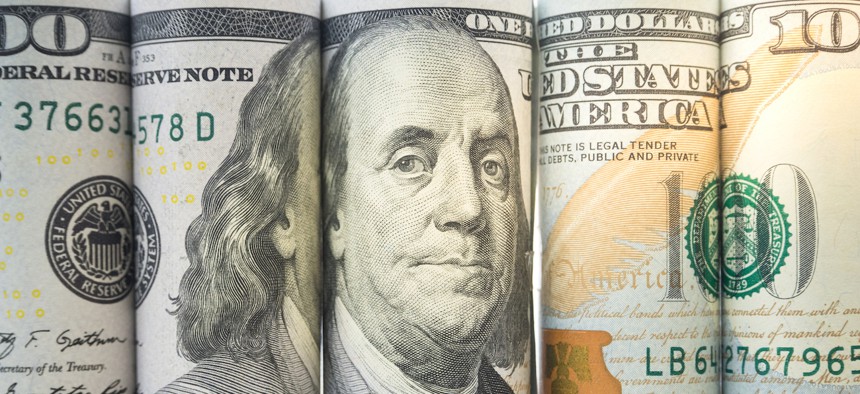
Researchers employed cutting-edge spectroscopic and imaging instruments to get a closer look than ever at the inks, paper and fibers that made Benjamin Franklin’s bills distinctive and hard to replicate. Sutthipong Kongtrakool/Getty Images
How Ben Franklin’s paper money outwitted counterfeiters
The founding father’s innovative way of making money kept him one step ahead of counterfeiters.
Researchers have used physics to get a peek at the early history of American money—and how Benjamin Franklin’s innovative way of making it kept him one step ahead of counterfeiters.
Franklin may be best known as the creator of bifocals and the lightning rod, but he should also be known for his innovative ways of making (literal) money.
During his career, Franklin printed nearly 2,500,000 money notes for the American colonies using what researchers have identified as highly original techniques, according to a new study in the Proceedings of the National Academy of Sciences.
The research team, led by Khachatur Manukyan, an associate research professor in the physics and astronomy department at the University of Notre Dame, spent the past seven years analyzing a trove of nearly 600 notes from the Colonial period, which is part of an extensive collection developed by the Hesburgh Libraries’ Rare Books and Special Collections.
The Colonial notes span an 80-year period and include notes printed by Franklin’s network of printing shops and other printers, as well as a series of counterfeit notes.
The effort to print money for the fledgling Colonial monetary system was important to Franklin not just as a printer but as a statesman as well, Manukyan says.
“Benjamin Franklin saw that the Colonies’ financial independence was necessary for their political independence. Most of the silver and gold coins brought to the British American colonies were rapidly drained away to pay for manufactured goods imported from abroad, leaving the Colonies without sufficient monetary supply to expand their economy,” he says.
However, one major problem stood in the way of efforts to print paper money: counterfeiting. When Franklin opened his printing house in 1728, paper money was a relatively new concept. Unlike gold and silver, paper money’s lack of intrinsic value meant it was constantly at risk of depreciating. There were no standardized bills in the Colonial period, leaving an opportunity for counterfeiters to pass off fake bills as real ones. In response, Franklin worked to embed a suite of security features that made his bills distinctive.
“To maintain the notes’ dependability, Franklin had to stay a step ahead of counterfeiters,” Manukyan says. “But the ledger where we know he recorded these printing decisions and methods has been lost to history. Using the techniques of physics, we have been able to restore, in part, some of what that record would have shown.”
Manukyan and his team used cutting-edge spectroscopic and imaging instruments housed in the Nuclear Science Laboratory and four Notre Dame research core facilities: the Center for Environmental Science and Technology, the Integrated Imaging Facility, the Materials Characterization Facility and the Molecular Structure Facility. The tools enabled them to get a closer look than ever at the inks, paper, and fibers that made Franklin’s bills distinctive and hard to replicate.
One of the most distinctive features they found was in Franklin’s pigments. Manukyan and his team determined the chemical elements used for each item in Notre Dame’s collection of Colonial notes. The counterfeits, they found, have distinctive high quantities of calcium and phosphorus, but these elements are found only in traces in the genuine bills.
Their analyses revealed that although Franklin used (and sold) “lamp black,” a pigment created by burning vegetable oils, for most printing, Franklin’s printed currency used a special black dye made from graphite found in rock. This pigment is also different from the “bone black” made from burned bone, which was favored both by counterfeiters and by those outside Franklin’s network of printing houses.
Another of Franklin’s innovations was in the paper itself. The invention of including tiny fibers in paper pulp—visible as pigmented squiggles within paper money—has often been credited to paper manufacturer Zenas Marshall Crane, who introduced this practice in 1844. But Manukyan and his team found evidence that Franklin was including colored silks in his paper much earlier.
The team also discovered that notes printed by Franklin’s network have a distinctive look due to the addition of a translucent material they identified as muscovite. The team determined that Franklin began adding muscovite to his papers and the size of this muscovite crystals in his paper increased over time.
The team speculates that Franklin initially began adding muscovite to make the printed notes more durable but continued to add it when it proved to be a helpful deterrent to counterfeiters.
It is unusual for a physics lab to work with rare and archival materials, and this posed special challenges, Manukyan says.
“Few scientists are interested in working with materials like these. In some cases, these bills are one-of-a-kind. They must be handled with extreme care, and they cannot be damaged. Those are constraints that would turn many physicists off to a project like this.”
Additional coauthors are from the Conservation Center at New York University’s Institute of Fine Arts, Ohio State University, Gatan Inc., and Notre Dame.
An internal grant from Notre Dame Research funded the work.
Source: University of Notre Dame






